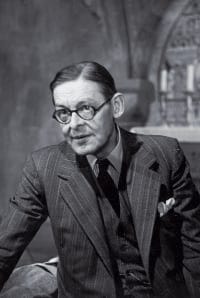Where Waste Land Blooms
The month of April is passing by. It has found literary distinction by being the first word of a much loved poem The Waste Land by T S Eliot. English poetry lovers would readily give in to its poetical enchantment - ' APRIL is the cruellest month, breeding / Lilacs out of the dead land, mixing /Memory and desire, stirring / Dull roots with spring rain. / Winter kept us warm, covering / Earth in forgetful snow, feeding / A little life with dead tubers. / Summer surprised us, coming over the Starnbergersee / With a shower of rain, we stopped in the colonnade, / And went on in sunlight, into the Hofgarten, / And drank coffee, and talked for an hour'.
In two years from now, the literary world will observe the 50th death anniversary of T S Eliot. He was born on September 26, 1888 in St Louis, Missouri, USA. He was very proud of the ancestry of being born near the river Mississippi and recalled, " It is self-evident that St Louis affected me more deeply than any other environment has ever done. I feel that there is something in having passed one's childhood near the great river." He, however, moved to England and settled there permanently.
T S Eliot is among the greatest poets of English language. He has a special place for being in the forefront of the Modernist movement in English poetry. It is the poem The Love Song of J. Alfred Prufrock (1915) that brought him fame. 'Prufrock' was T S Eliot's first publication outside of school and university. The poem focuses on the struggles that go on inside a mind caught in anguish.
The Waste Land (1922), widely admired as a masterpiece in English language poetry, made him a celebrity. A five part poem ( I. The Burial of the Dead, II. A Game of Chess, III. The Fire Sermon, IV. Death by Water, V. What the Thunder Said), The Waste Land created a sensation among poetry lovers, particularly among the young readers. A combination of familiarity with western languages, Greek, Latin, German and French, his innate gift of mellifluous expression and his inimitable style of composition made The Waste Land a fascinating reading of lasting appeal. James Joyce's magnum opus Ulysses T S Eliot's The Waste Land and Albert Einstein's theories of Physics were lauded as the incomparable triad of the time.

The Waste Land is a period poem. Europe, after the acrimonious attrition of World War I, was in gloom and in a state of decline. Ireland was fighting for independence. There was bitter recrimination in Germany about the sudden surrender and the humiliating terms of the armistice. Russia was caught in the bloodletting of Bolshevik Revolution. Greece was making steady gains with the fall of Ottoman Empire. Anti-Jewish rage was rising in Germany and Central Europe. It was a depressing time for Europe and the idealistic notion of Europe on the march lacked believers.
Eliot's personal life too was in trouble; particularly his relationship with his father was strained. In 1927 he converted to Anglicanism from Unitarianism. He had a history of nervous breakdowns and writer's block, but for The Waste Land his thoughts were in full bloom. He was young, only 33, the subject was close to his heart and Ezra Pound, his friend and editor, was at his side. The consummation was most befitting for the extraordinary gifts of T. S. Eliot.
Ezra Pound fully believed in the talents of T. S. Eliot and in fact, it is he who was the midwife to The Waste Land. He suggested Eliot refrain from using caustic remarks about London city from Joseph Conrad's Heart of Darkness, in the epigraph. He obliged. In the text one finds, 'Unreal city'. Another great poet W B Yeats was critical about the enthusiasm for The Waste Land. One can however find similarity between W B Yeats' Sailing to Byzantium and T S Eliot's The Waste Land in the exploratory journey and use of symbolisms. In Yeats' journey the aesthetic element predominates while in Eliot's Waste Land the exploration is of a reflective and lyrical nature.
The Waste Land took T S Eliot to dizzying heights; many more great poems followed. There were seven plays, the notable one being The Murder in Cathedral (1935). The Hollow Men (1925), Ash Wednesday (1930) and The Four Quartets (1945) are also among the adored poems of English language by T S Eliot. The Hollow Men is also in five parts. The first few lines are - ' We are the hollow men / We are the stuffed men / Leaning together / Headpiece filled with straw. Alas!/ Our dried voices, when / We whisper together / Are quiet and meaningless / As wind in dried grass / Or rats'feet over broken glass / In our dry cellar'.
Ash Wednesday is another remarkably resonant poem of T S Eliot. It belongs to the class of The Waste Land. The tale from the heart in Ash Wednesday is overpowering - 'Because I do not hope to turn again / Because I do not hope / Because I do not hope to turn / Desiring this man's gift and that man's scope / I no longer strive to strive towards such things / (Why should the aged eagle stretch its wings?) / Why should I mourn…'
Thomas Stearns Eliot was not born with the best of physical health. He had double inguinal hernia that prevented him from taking part in sport. He overcame his limitation by devoting himself to books and learning. The gift was within him and the limitation spurred him on. He showed the promise in every stage of his educational career. The Eliots were a privileged family. But he charted his own course and rose to international acclaim. The Nobel Prize for literature came in 1948. The love for English poetry is the legacy of a band of a few illustrious poets, T S Eliot is fascinatingly endearing among them.


 For all latest news, follow The Daily Star's Google News channel.
For all latest news, follow The Daily Star's Google News channel. 




Comments